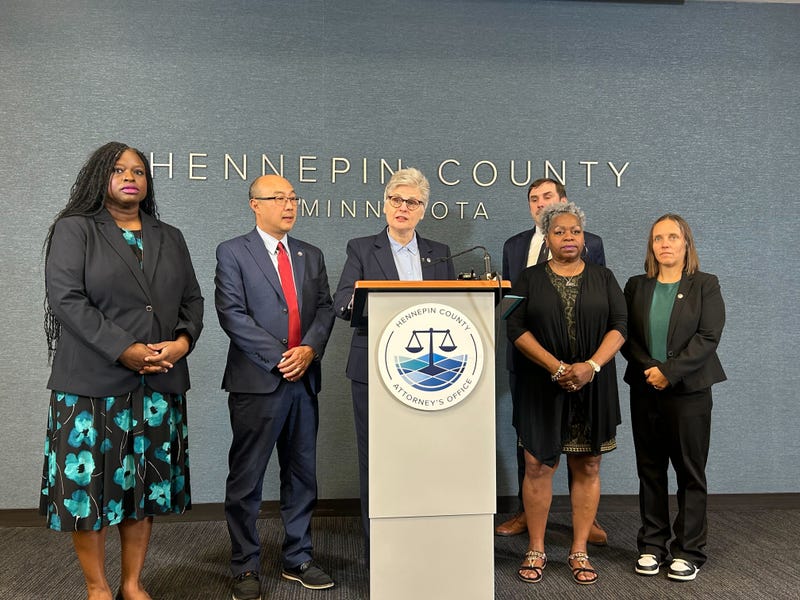
Hennepin County Attorney Mary Moriarty announced on Wednesday that her office would discontinue prosecuting cases that step from "pretext" or low-level traffic stops.
The Attorney's Office says stops for things like headlight issues, or broken tail lights target Black drivers disproportionately, and don't result in enough serious criminal charges.
"Non-public-safety traffic stops do not protect public safety, and they actively harm our community, particularly our Black and Brown community members," Moriarty said. "Speeding, distracted driving, driving under the influence, and blowing through stop signs threatens public safety and kills Minnesotans. We will continue to prosecute felony cases resulting from dangerous driving behavior."
Members of the Hennepin County Police Chiefs Association on Friday blasted the new standards.
They said that having a one-size-fits-all policy doesn't reflect on how different communities are in Minnesota's most populous county.
"We do not pick and choose which laws to enforce," said group president Scott Boerboom, police chief of Minnetonka. "This decision by the county attorney does exactly that, putting us in an impossible position, (making ) it harder for us to do their jobs."
Boerboom was critical of Moriarty's office for non including the chiefs when forming the new policy."
Hennepin County sheriff DeWanna Witt held up a newspaper that included the headline "12 shot in Minneapolis in the span of 12 hours."
"With that amount of violence our area has endured over the last few months, now is not the time to lower the standards of public safety," she said.
When asked if anyone had communication with Moriarty since the new policy was unveiled, the two-dozen law enforcement officials looked around to see if it had happened.
The new policy from the Attorney's Office will go into effect on October 15. They list several categories they will no longer prosecute if they are the only reason for a traffic stop, and subsequent search.
Moriarty says the policy which is already in place in Ramsey county aims to end a tactic that has been shown to harm communities.
The infractions include failure to display tabs or expired tabs, not illuminating a license plate or a partially obscured plate, broken headlights, brake lights or taillights, missing the side mirror or rearview mirror, items dangling from the rearview mirror, broken wipers, failure to signal a turn or lane change, a cracked windshield, and excessive window tint.
That means an officer that pulls over a driver for these issues, and finds other criminal behavior such as illegal possession of drugs or guns, the County Attorney would decline to prosecute the case.
According to Moriarty, Minneapolis Police data shows that these types of stops are "not worth the cost." She says studies indicate 99% of those stops fail to recover any contraband.
"This policy is grounded in research and best practices that clearly demonstrate these stops deeply undermine community trust, which has a significant negative impact on law enforcement's ability to investigate crime and our ability to prosecute cases," Moriarty added.
Minneapolis Police Chief Brian O'Hara says their current consent decree with the State of Minnesota already prohibits those kinds of stops, but their own policies and data had ended the practice in the city previous to his arrival.
"They were prohibited, they represented a very, very, very small percentage of the traffic stops that were being made here when I first became chief," O'Hara told WCCO's Chad Hartman. "So I think it's largely a non-issue for us."
O'Hara does say there will undoubtedly be an effect on other jurisdictions and agencies within Hennepin County, such as the Minnesota State Patrol and Hennepin County Sheriff's Department.
"Why would we spend limited time and money on a tactic that fails 99 times out of a hundred," Moriarty asked. "It's an enormous waste of resources and comes at a devastating cost to our community."
Moriarty also noted two of the most high-profile stops of this kind in Minnesota, which led to the shooting deaths of Daunte Wright in Brooklyn Center in 2021, and Philando Castile in Falcon Heights in 2016. Castile was pulled over for a broken tail light. Wright was pulled over by Brooklyn Center Police for expired plates and an illegal air freshener.
Officers attempted to take Wright into custody due to the warrant. Officer Kim Potter, who was training another officer, drew her handgun and yelled "Taser, Taser, Taser" before firing her gun into Wright's chest killing him.
Castile was shot after telling St. Anthony Police Officer Jeronimo Yanez he had a legal gun in his possession. Yanez ended up firing multiple shots into the vehicle killing Castile.
